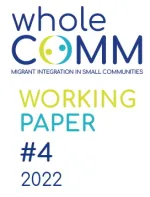Post-2014 migrants’ access to housing, employment and other crucial resources in small- and medium-sized towns and rural areas in Turkey

Working Paper No. 4 - Turkey
This report looks at post-2014 migrants’ access to housing, employment, and other relevant resources in different small and medium-sized towns and rural areas in Turkey. Primarily based on interviews conducted in each of the three selected municipalities, it provides an overview of 1) the concrete barriers that post-2014 migrants are facing in relation to housing and employment; 2) the local actors who are involved in, and/or seen as responsible for, facilitating their access; 3) any concrete local measures or practices that help or hinder this access; and 4) the specific target groups of these measures, initiatives or practices. The report finds that there have been overarching similarities among these three localities in spite of their different characteristics in terms of size, political affiliation, experience of cultural diversity and structural factors. The national understanding of migration management in the course of rising centralization in Turkey seems to limit the responses of the local to the migration issue. However, at the same time, behind the overall passivity of the local authorities with different political affiliations, the motivations to be so are quite different as observed during the interviews. Based on the findings from the fieldwork, it is safe to state that in spite of different political affiliations, the active passivity of the municipalities has been found as common yet the reasons behind such active passivity may be diverse. Turkish examples make us also question the assumed positive relation between the diversity and the better integration in localities according to the Whole-Comm typology.